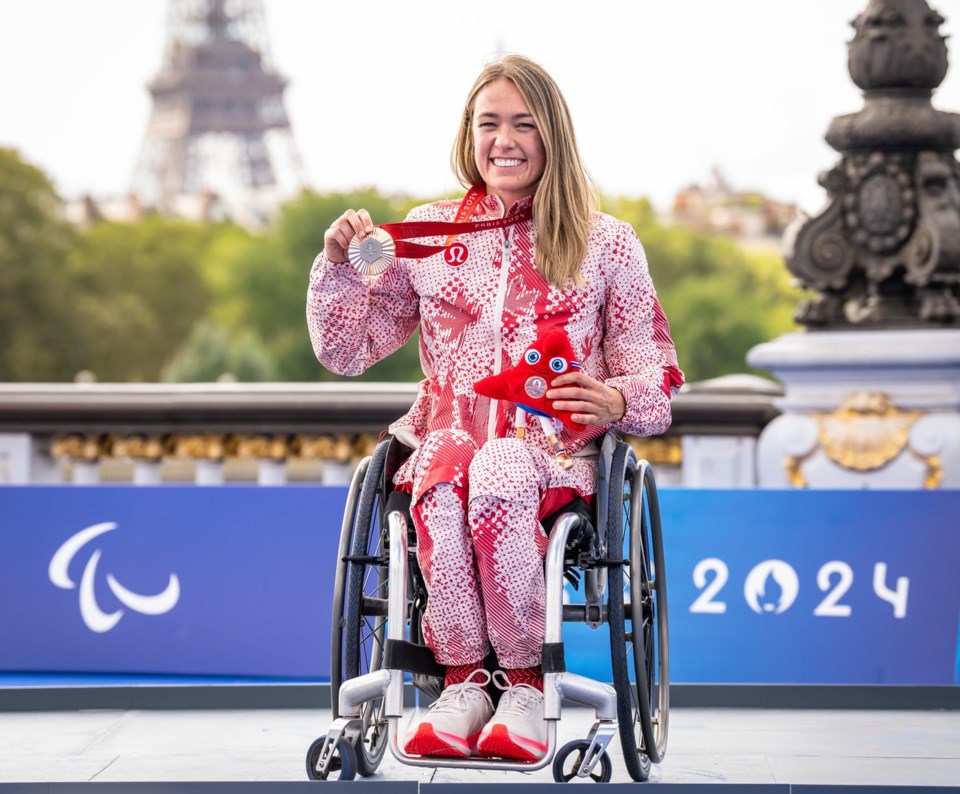PARIS — Paralympic triathlon in Paris was a mix of joy and pain for Canadians when races finally did get underway.
Winnipeg's Leanne Taylor became the first Canadian woman to win a Paralympic triathlon medal with a bronze in the women's class Monday.
Calgary's Stefan Daniel was leading his men's race when he crashed his bike into a barricade and was knocked out of contention.
The veteran won silver when para triathlon made its Paralympic debut in Rio in 2016, and was a bronze medallist three years ago in Tokyo.
The five-time world champion, who was born with club hands, is ranked world No.1 in his PTS5 classification.
After a schedule shuffle and then delays because of the Seine River's water quality, races in 11 different classes got underway — with multiple classes on course simultaneously — at the ornate Pont Alexandre bridge.
Para triathlon is a 750-metre swim, 20-kilometre bike and 5k run.
Taylor pumps a handcycle during the bike leg. Her run is a wheelchair race.
The 32-year-old stepped onto the podium six years after she was paralyzed from the waist down in a mountain biking accident.
"Coming to the Games was always the goal I set for myself in the hospital when I was injured six years ago," Taylor said.
"Being here felt like the big deal, what we were aiming for. In the last year, it started to look like it was possible for me to be on the podium."
With eventual winner Lauren Parker of Australia and silver medallist Kendall Gretsch of the United States well out front, Taylor girded herself to hunt down Brazil's Jessica Ferreira for a medal after the transition to the wheelchair race.
But Ferreira's crash after the transition to the wheelchair race put Taylor in medal position.
"It's an absolute heartbreak to see that the Brazilian crashed," Taylor said.
"The sad thing is that's triathlon. She and I have both given medals in some ways to each other by making a mistake or having a crash. This has sort of happened back and forth.
"That's one of the things about triathlon and why you have to keep fighting on even if you're not in the place you expect to be. You never know what's going to happen. It worked in my favour this time and maybe not next."
Fortune did not favour Daniel.
Fifth after his Seine swim, Daniel had charged to the front with just over 5k remaining on the bike when he misjudged a hairpin turn and flew into the barricades.
The 27-year-old continued to race once he knew his bike was still operational, but his bid for another Paralympic medal was over.
Daniel's face crumpled as he near the finished line.
"You don't get to go to too many Paralympics in a lifetime," the Canadian said. "I've always held the strong belief if you're physically able to finish a race., you do it. No matter what."
He was composed after he was treated for scrapes in the medical tent.
"Right before the last lap, I went too fast into a U-turn and just went into the barricades," Daniel said. "I just miscalculated it. Lapse of judgment. I was down before I knew it.
"It hasn't really hit me. A little disbelief, shock. It would have been worse if I didn't finish. I'm glad that I finished and I got across the line. I'll take some comfort in that in a little bit here.
"Right now, yeah, I'm gutted."
His teammate Kamylle Frenette of Dieppe, N.B., was fourth among PTS5 women.
"I was hoping for the podium, but fourth place in the world is really good," Frenette said.
"Sitting on the pontoon, I was overlooking the Eiffel Tower. It's such a beautiful venue, so really thankful for that.
"I'm always a bit nervous on the bike and I unfortunately saw my teammate crash, so that was a bit emotional to see that.
"The run, I was pretty solidly in fourth at that point so I just let myself enjoy and look around."
Seine's water quality headaches that plagued Olympic triathlon continued into the Paralympics.
Taylor's race initially schedule for Monday was shifted to Sunday and then back again.
Daniel and Frenette saw their start times shuffled Sunday and ultimately their triathlons delayed a day.
Athletes awoke wondering if they would race, or if their triathlons would be reduced to a duathlon of a bike and a run.
"It would be a lie if I said it wasn't a challenge," Taylor said. "Knowing it could be anything and trying to be prepared for everything was honestly very difficult.
"Once we got into the water, it was doing the thing we knew how to do and at that point, I was OK."
This report by The Canadian Press was first published Sept. 2, 2024.
Donna Spencer, The Canadian Press

